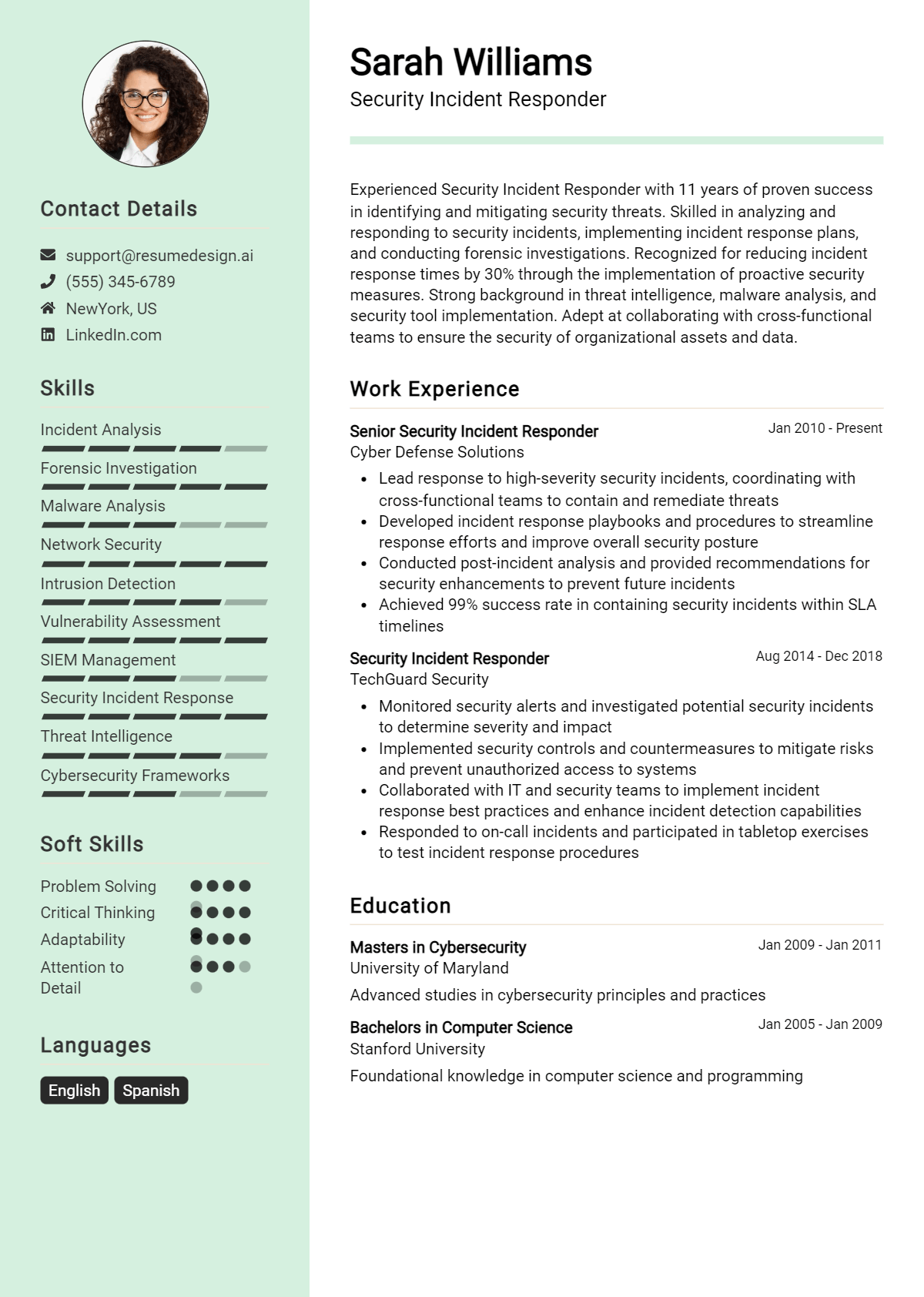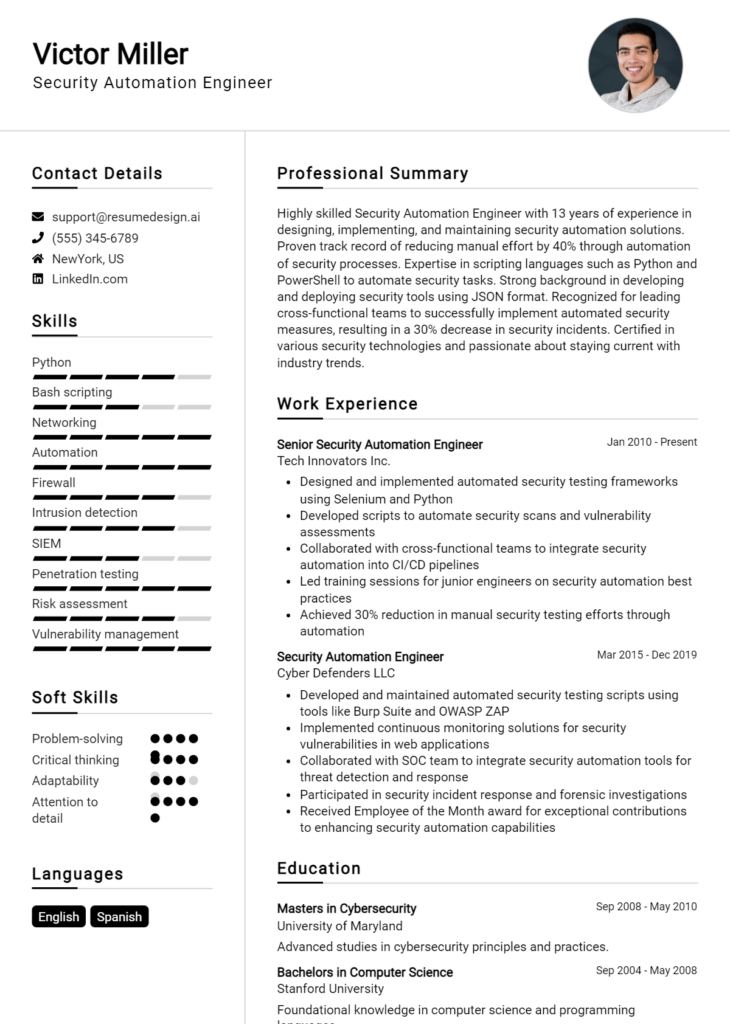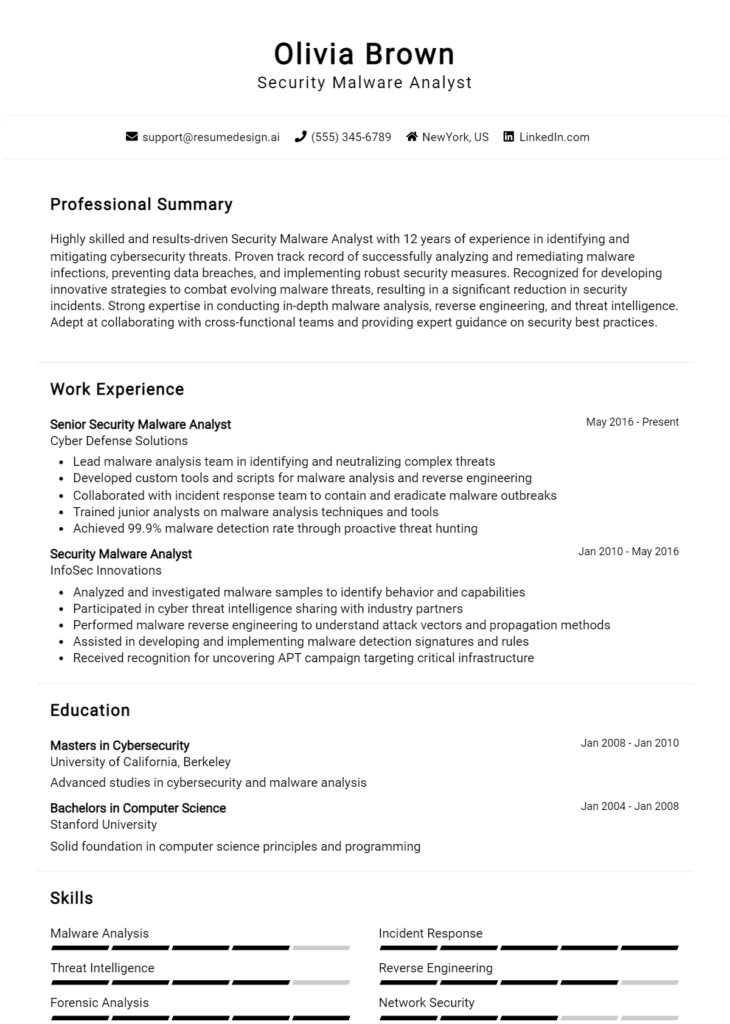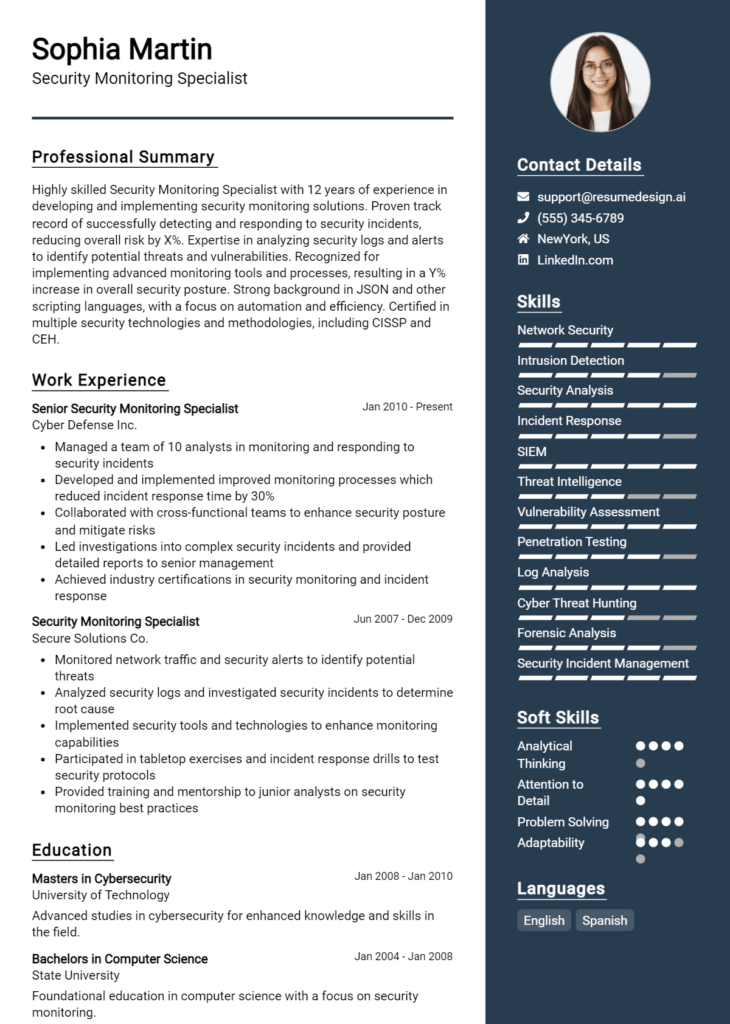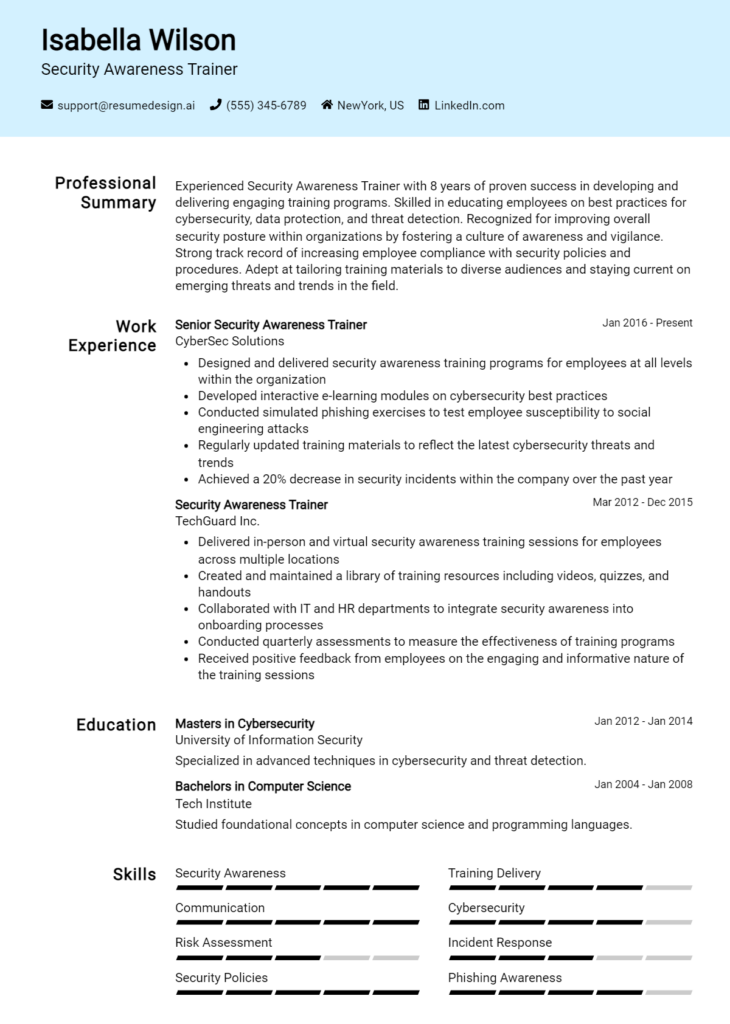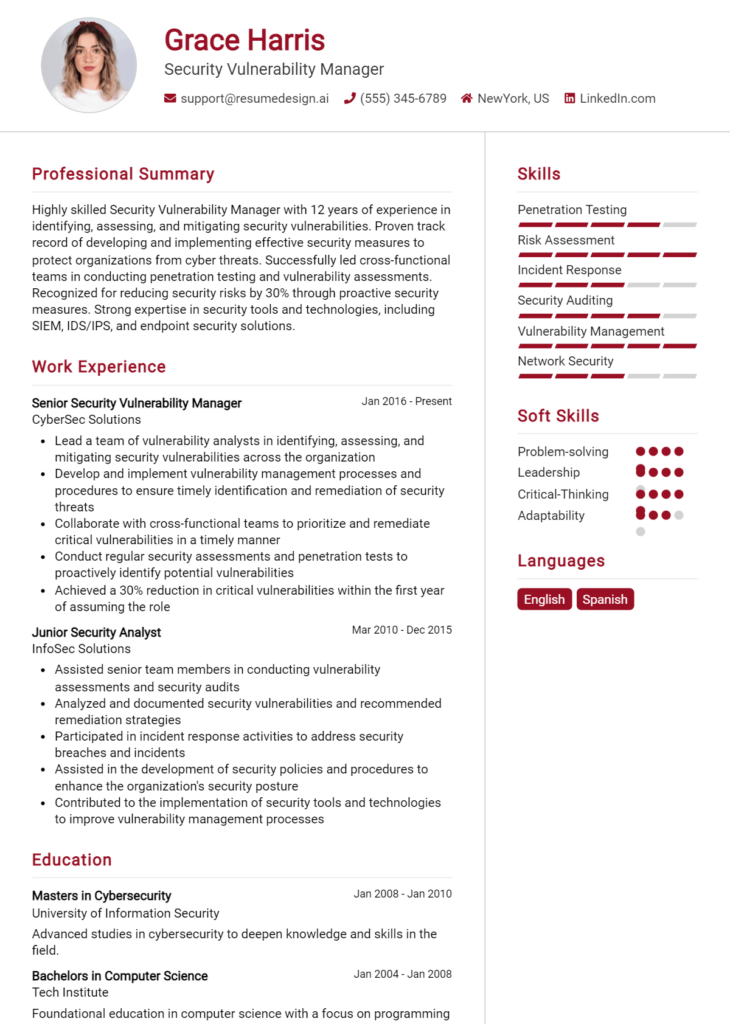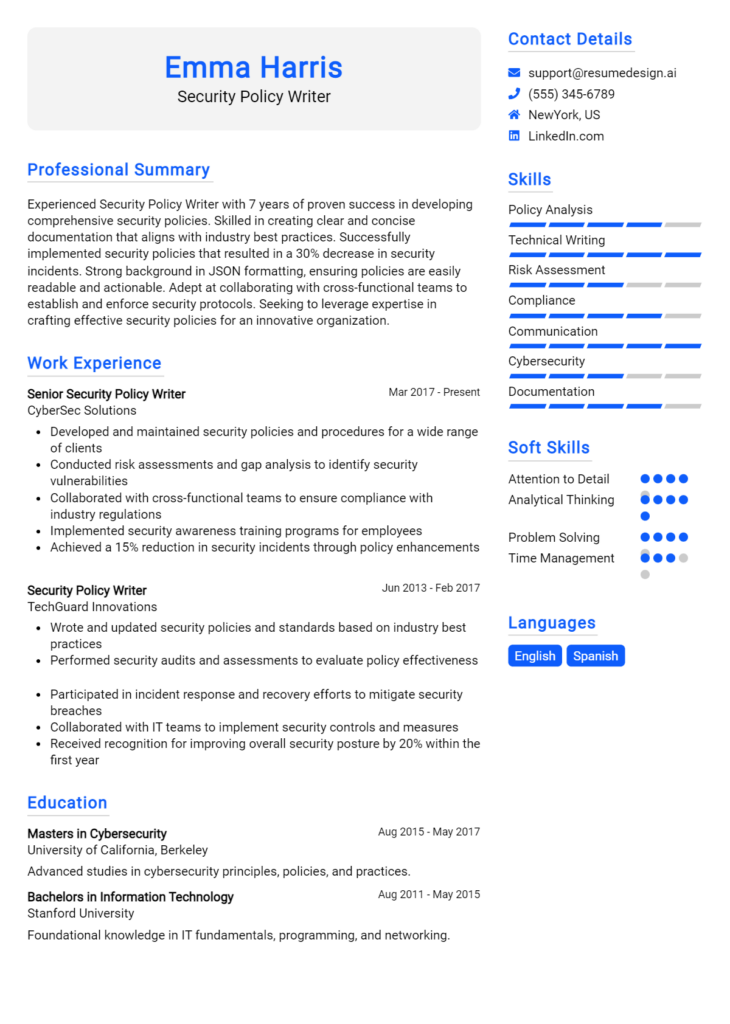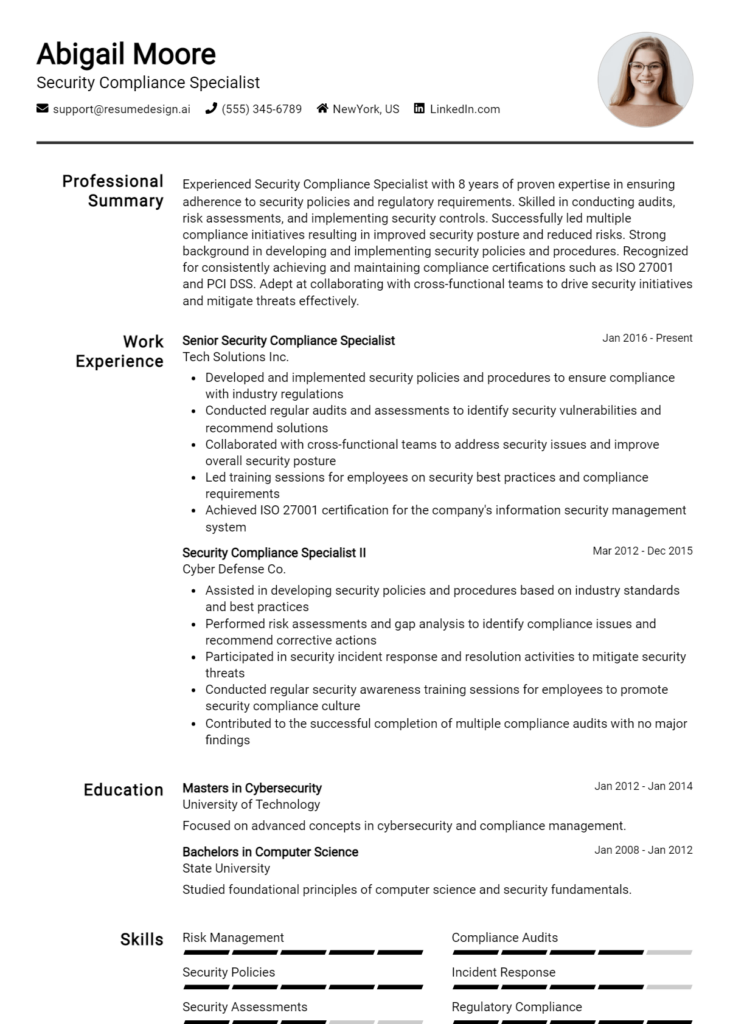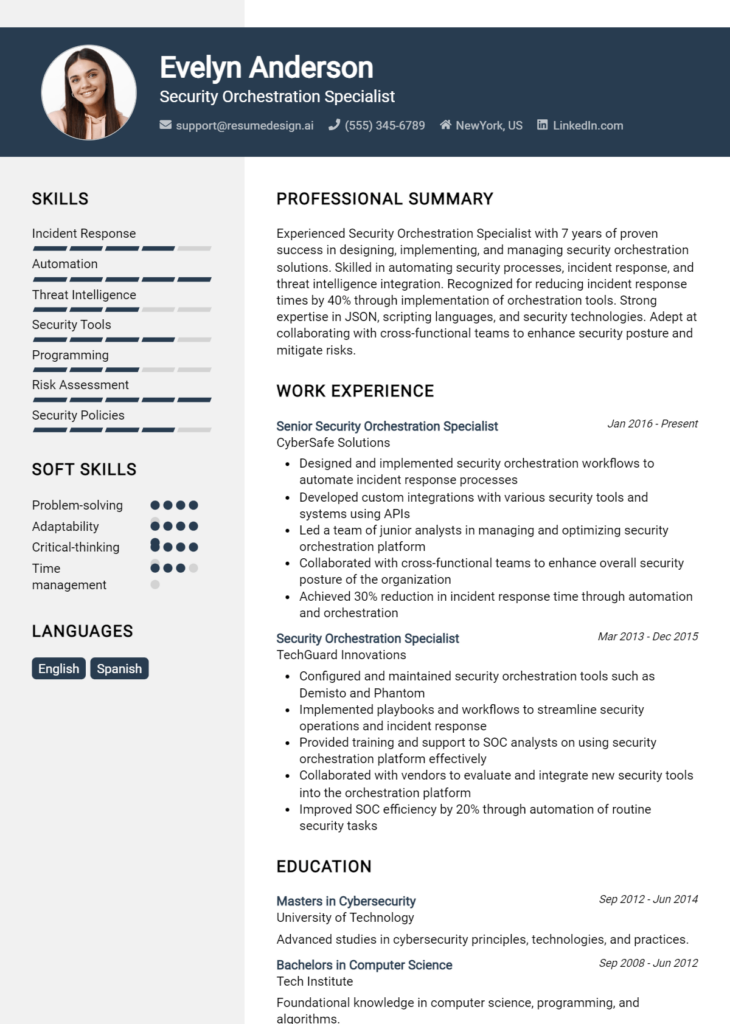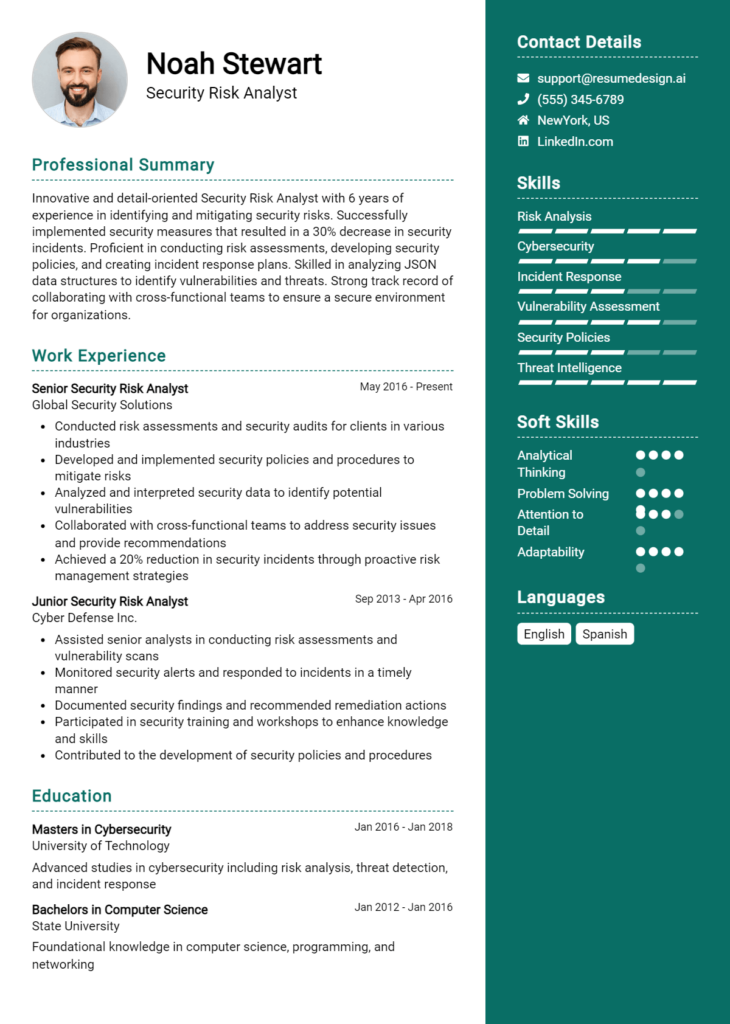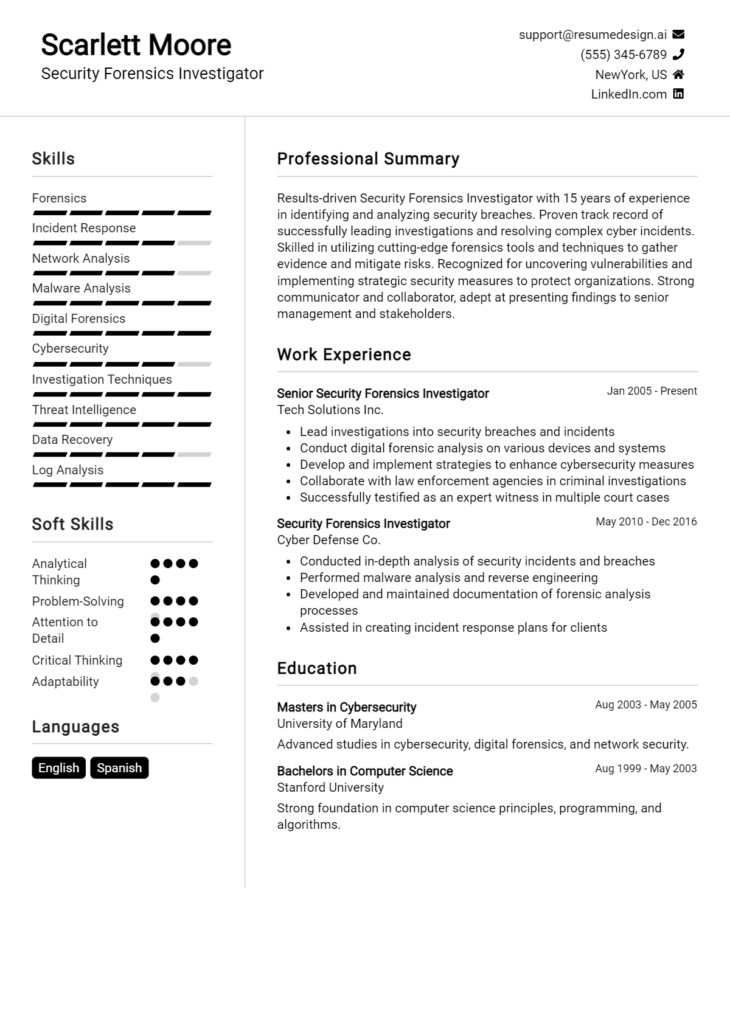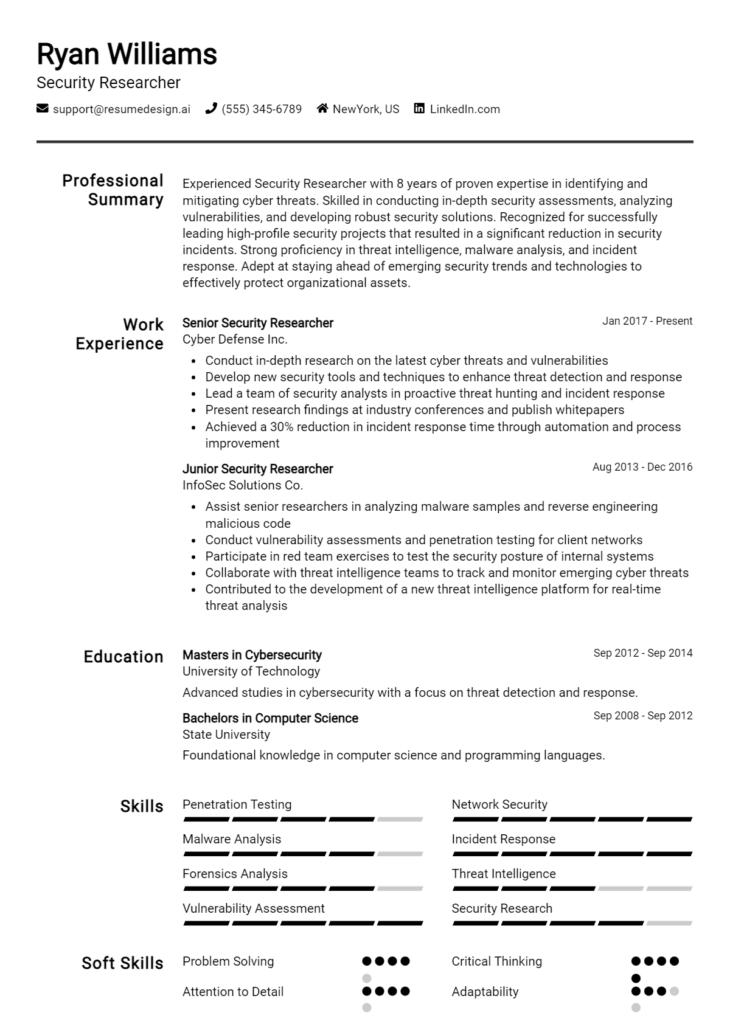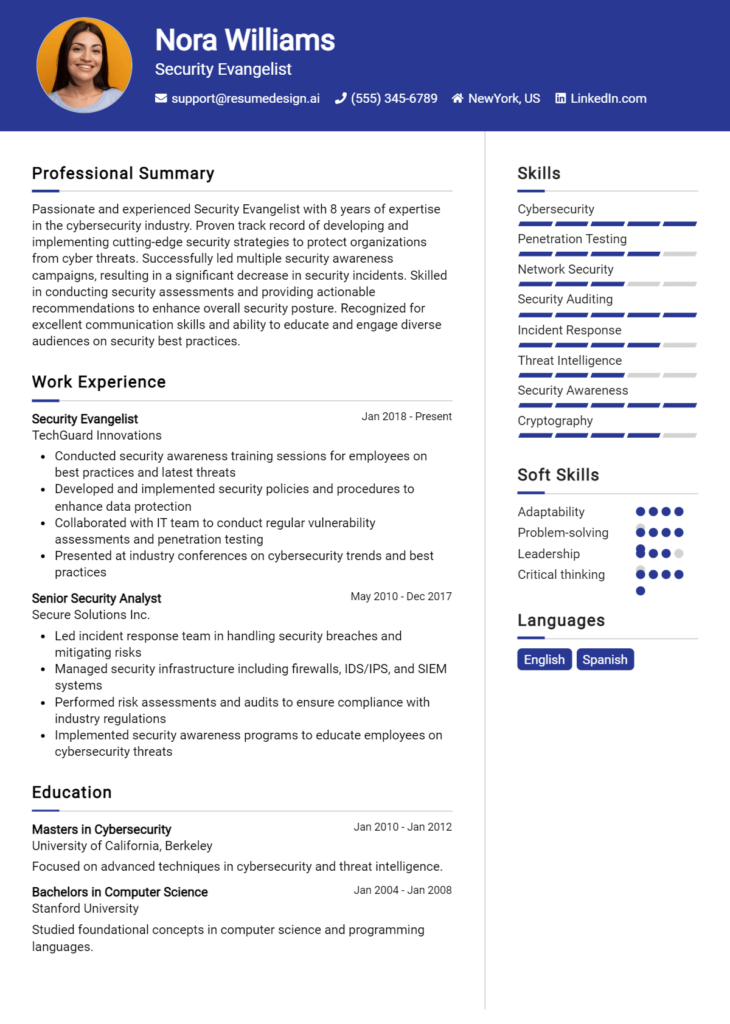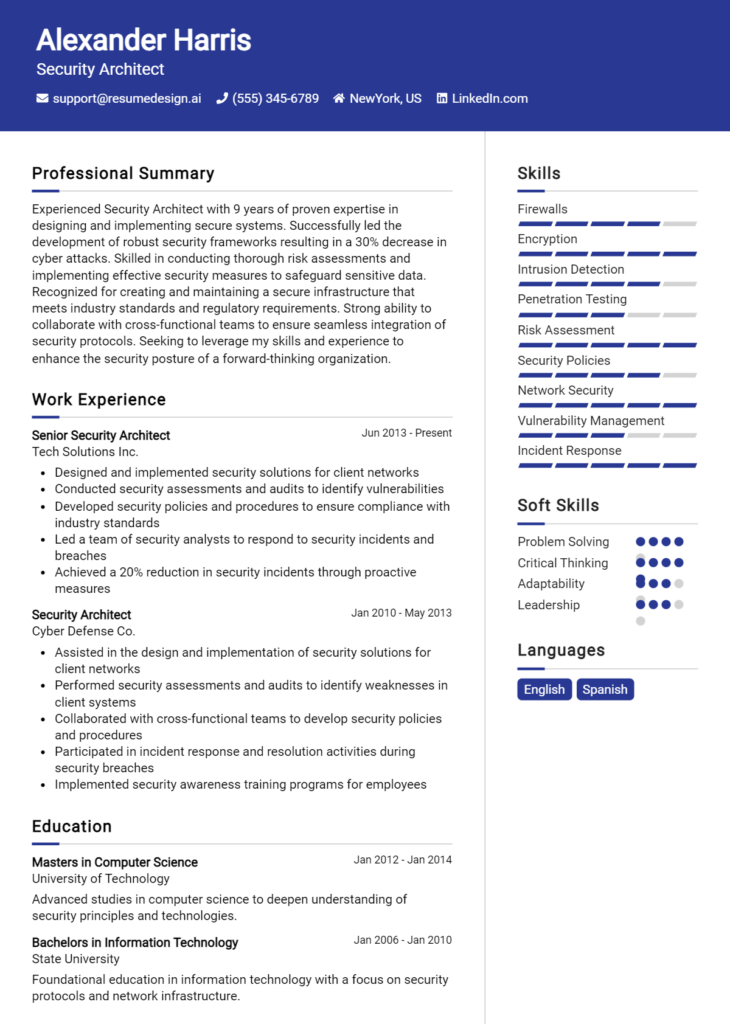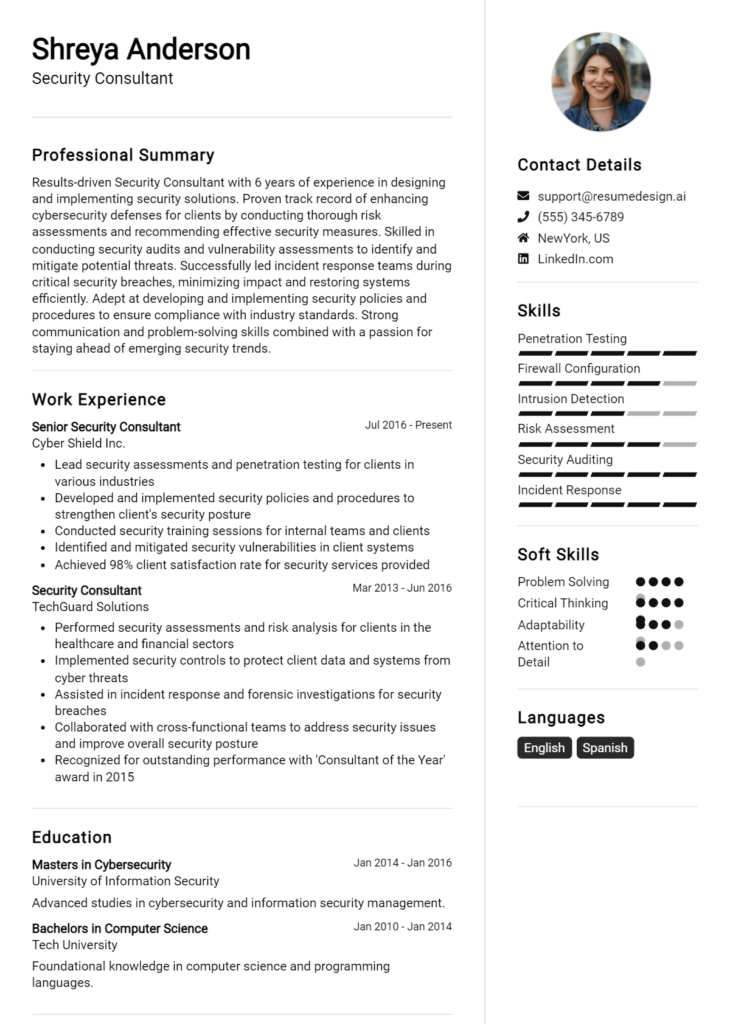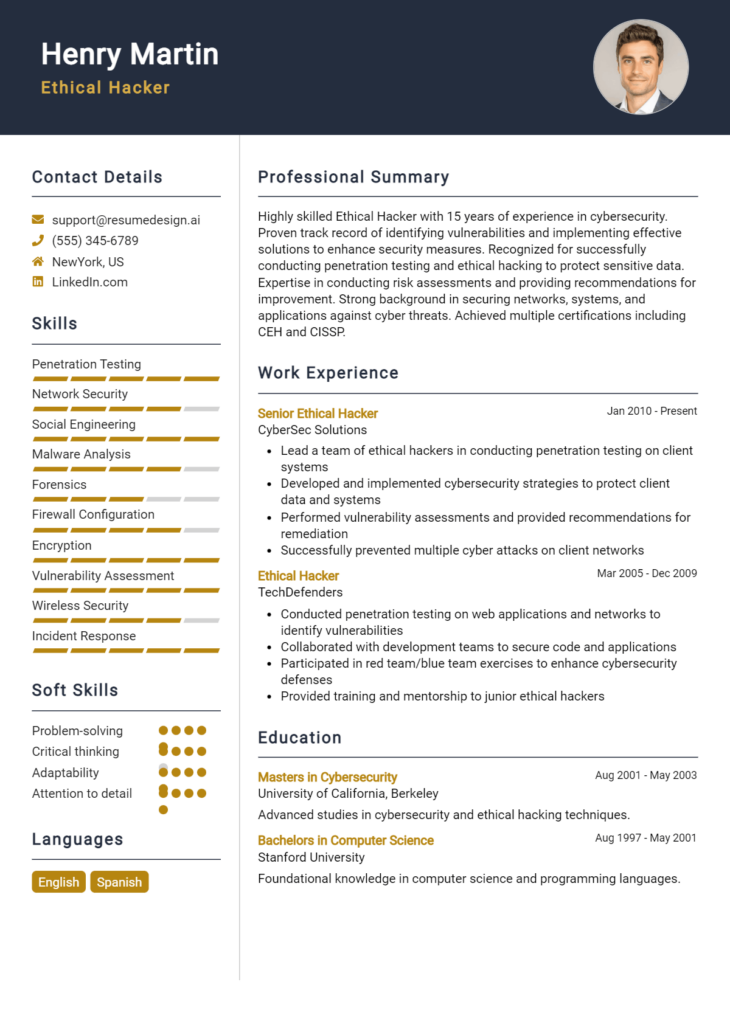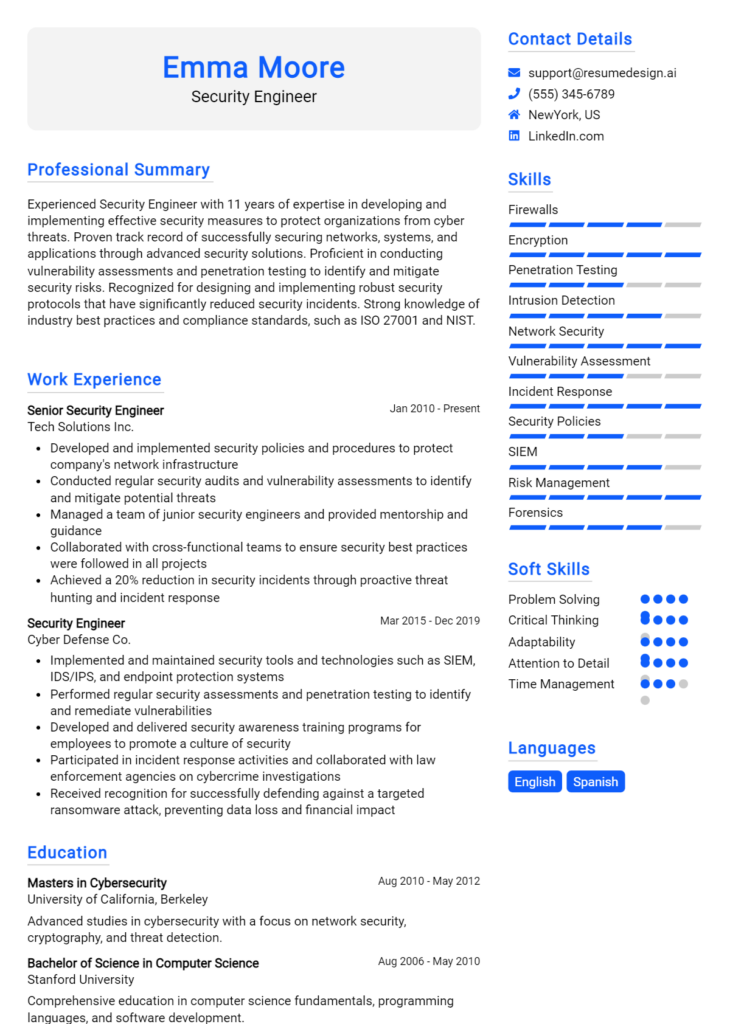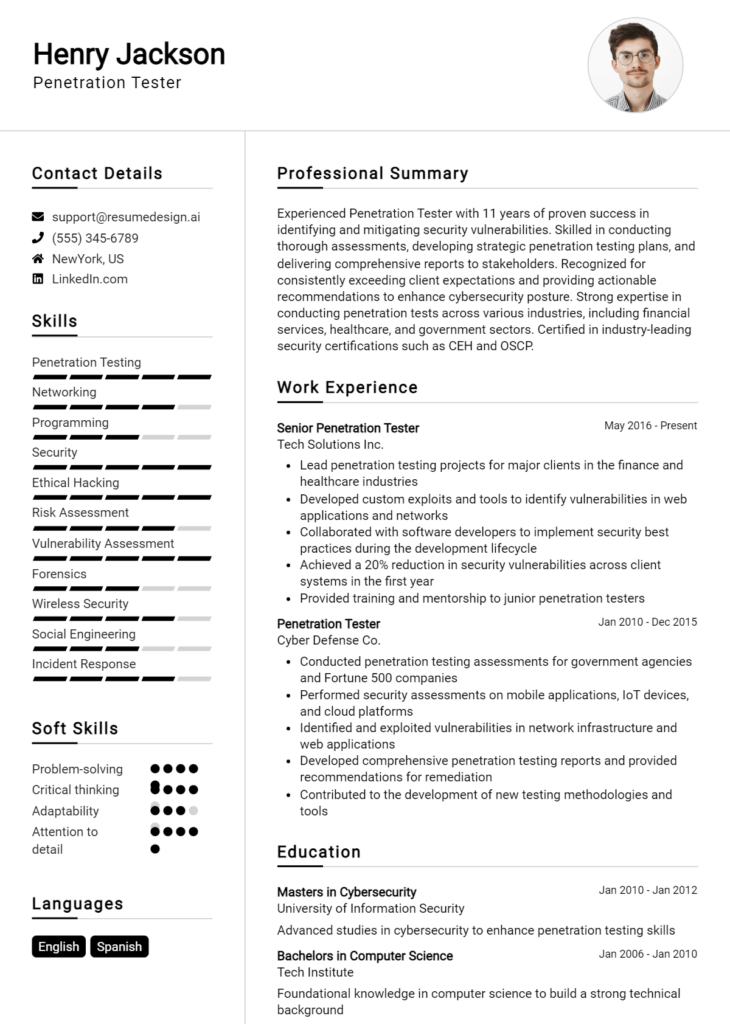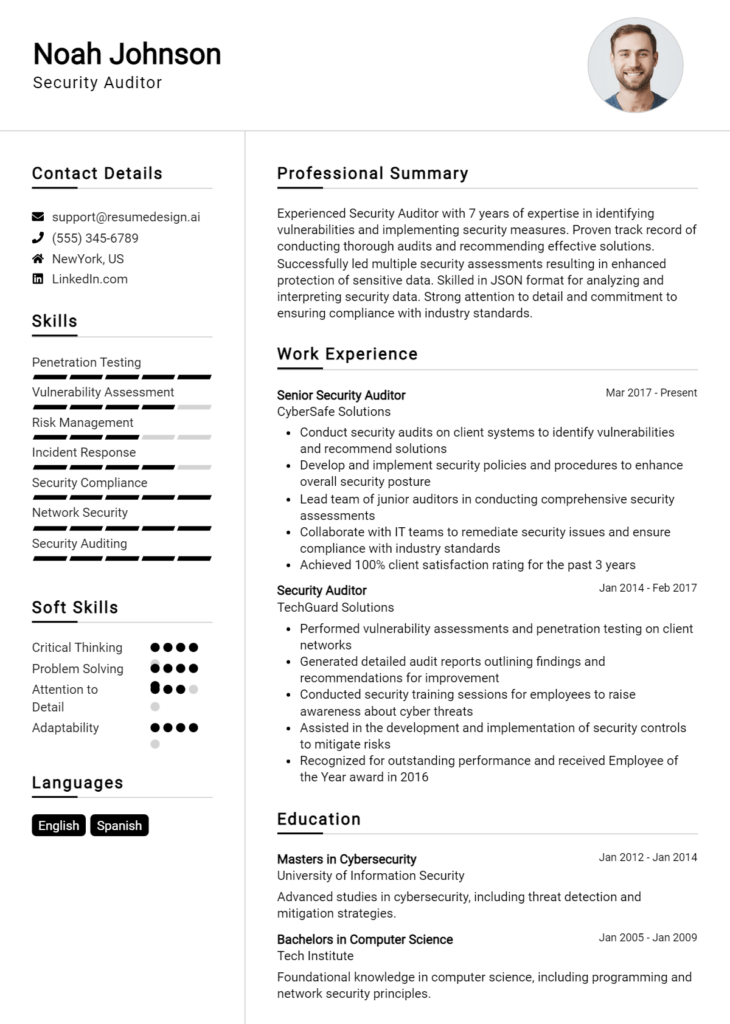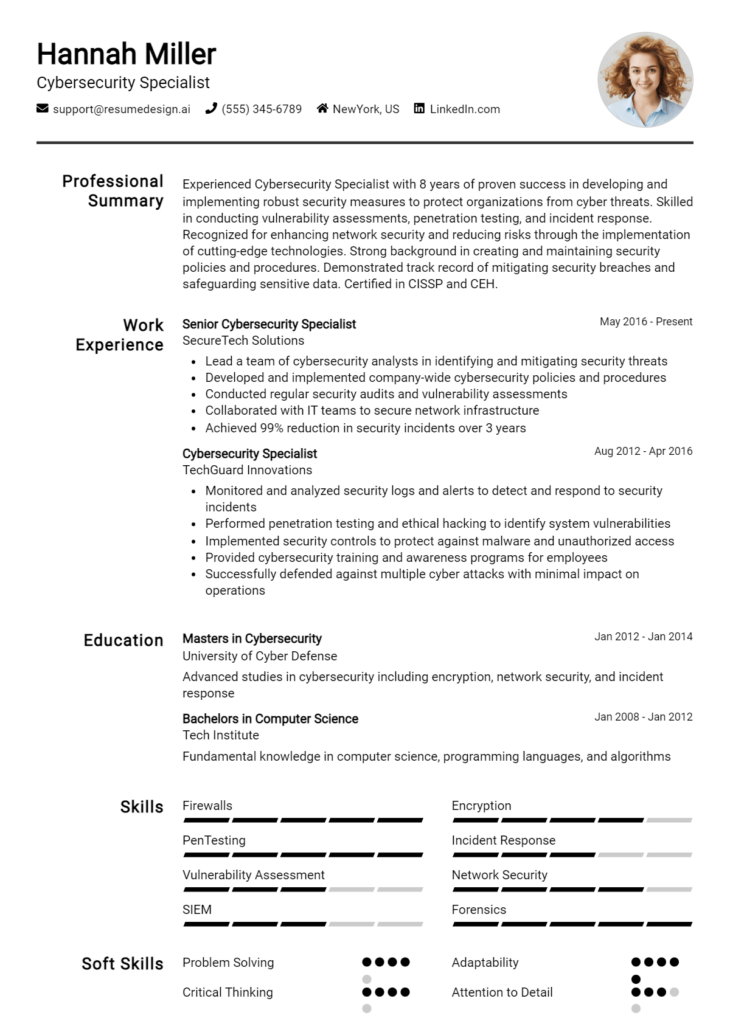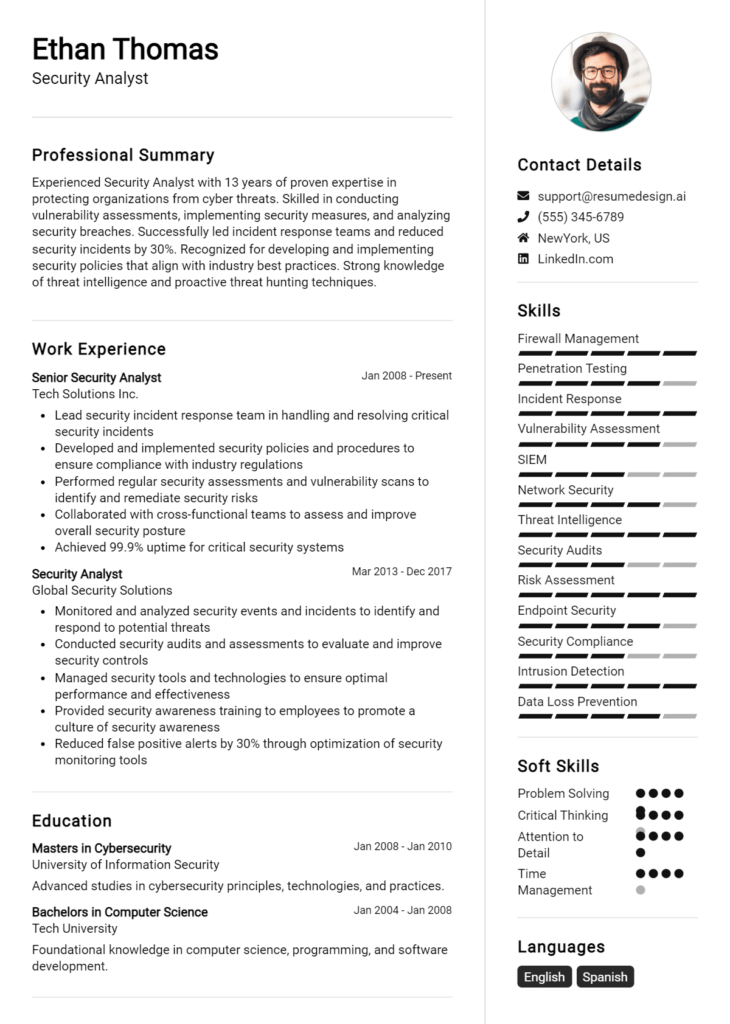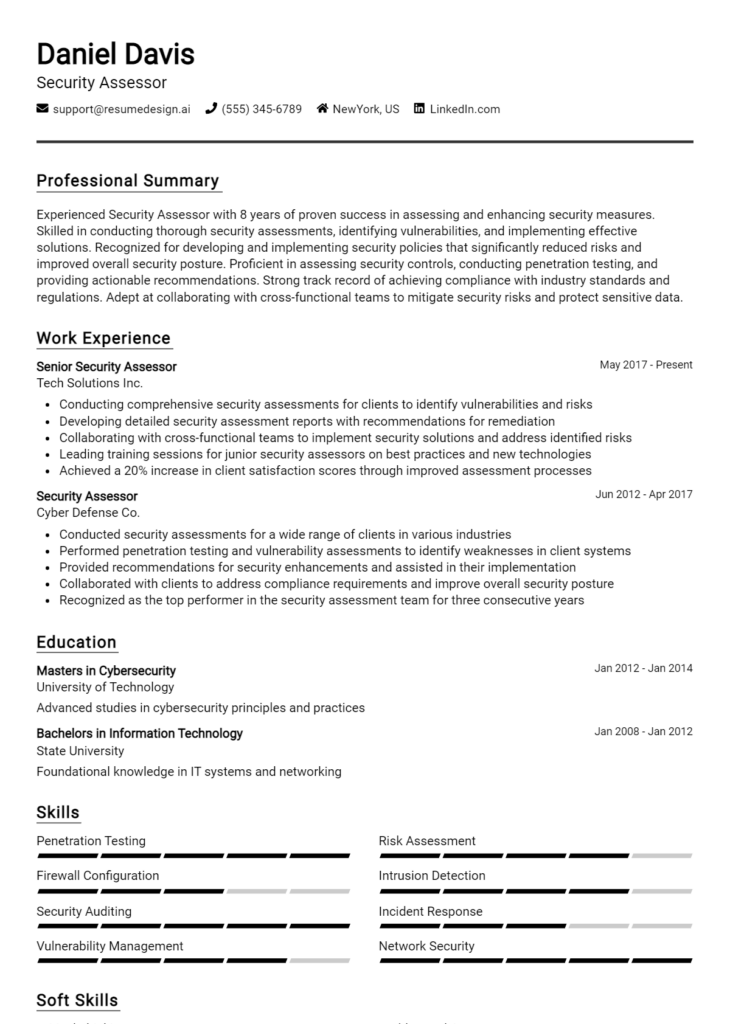Security Incident Responder Core Responsibilities
A Security Incident Responder plays a crucial role in safeguarding an organization's information assets by identifying, investigating, and mitigating security incidents. This position requires a blend of technical expertise, operational acumen, and strong problem-solving skills to effectively assess threats and coordinate responses across various departments, bridging IT, compliance, and management functions. Proficiency in cybersecurity tools and incident response frameworks is essential, as these skills contribute significantly to achieving the organization's security objectives. A well-structured resume can effectively highlight these qualifications, showcasing the candidate's ability to address complex challenges in a fast-paced environment.
Common Responsibilities Listed on Security Incident Responder Resume
- Monitor security alerts and analyze potential threats.
- Investigate security incidents and perform root cause analyses.
- Coordinate incident response efforts across departments.
- Develop and implement incident response plans.
- Conduct regular security assessments and vulnerability analyses.
- Collaborate with law enforcement and regulatory bodies as needed.
- Prepare detailed incident reports and documentation.
- Provide training and guidance to staff on security best practices.
- Stay updated on emerging security threats and trends.
- Utilize threat intelligence to enhance security posture.
- Participate in post-incident reviews to improve processes.
High-Level Resume Tips for Security Incident Responder Professionals
In the highly competitive field of cybersecurity, a well-crafted resume serves as a crucial first impression for Security Incident Responder professionals. Your resume is not just a document; it's a powerful marketing tool that showcases your skills, experiences, and achievements to potential employers. Given the critical nature of the role, which involves swiftly addressing security breaches and protecting sensitive information, your resume needs to convey your technical prowess and problem-solving abilities effectively. This guide will provide practical and actionable resume tips specifically tailored for Security Incident Responder professionals, ensuring that your application stands out in a crowded job market.
Top Resume Tips for Security Incident Responder Professionals
- Tailor your resume for each job application by closely aligning your skills and experiences with the job description.
- Highlight relevant certifications such as CISSP, CEH, or GCIH to demonstrate your commitment to professional development in cybersecurity.
- Showcase your hands-on experience in incident response, including specific roles you’ve played in security incidents and your contributions to resolution.
- Quantify your achievements by including metrics, such as the number of incidents handled or percentage of breaches mitigated, to illustrate your impact.
- Emphasize technical skills relevant to the role, such as familiarity with SIEM tools, malware analysis, and forensic techniques.
- Include a section for soft skills, such as communication and teamwork, which are crucial in coordinating responses during security incidents.
- Utilize action verbs to describe your experiences, such as “analyzed,” “developed,” or “executed,” to convey a sense of proactivity and engagement.
- Keep your resume concise and focused, ideally one page, ensuring that only the most relevant information is included.
- Consider adding a professional summary at the top of your resume that encapsulates your expertise and career goals in the cybersecurity field.
By implementing these tips, you can significantly enhance your chances of landing a job in the Security Incident Responder field. A polished and tailored resume not only showcases your qualifications but also demonstrates your attention to detail and professionalism—qualities that are highly valued in the cybersecurity domain.
Why Resume Headlines & Titles are Important for Security Incident Responder
In the competitive field of cybersecurity, the role of a Security Incident Responder is critical for organizations aiming to protect their digital assets from threats. When crafting a resume for this position, a headline or title is essential as it serves as the first impression for hiring managers. A strong headline can immediately grab attention and summarize a candidate's key qualifications in a single impactful phrase, setting the tone for the rest of the resume. It should be concise, relevant, and directly related to the job being applied for, ensuring that it resonates with the specific demands of the Security Incident Responder role.
Best Practices for Crafting Resume Headlines for Security Incident Responder
- Keep it concise: Aim for a headline that is brief yet descriptive, ideally no more than 10-12 words.
- Be role-specific: Tailor your headline to reflect the specific responsibilities and skills of a Security Incident Responder.
- Highlight key strengths: Focus on your most impressive skills, experiences, or certifications that align with the job description.
- Use industry keywords: Incorporate relevant keywords that hiring managers are likely to search for in candidates.
- Avoid jargon: Make sure your headline is easily understandable, avoiding overly technical language or acronyms.
- Make it impactful: Use action words that convey a sense of achievement or expertise.
- Showcase results: If possible, include quantifiable achievements that demonstrate your effectiveness in previous roles.
- Align with the job posting: Review the job description and ensure your headline reflects the most important qualifications highlighted by the employer.
Example Resume Headlines for Security Incident Responder
Strong Resume Headlines
Certified Information Systems Security Professional (CISSP) with 5+ Years in Incident Response
Proactive Security Incident Responder Specializing in Threat Detection and Mitigation
Experienced Cybersecurity Analyst with Proven Track Record in Incident Management
Skilled Incident Responder with Expertise in Forensics and Malware Analysis
Weak Resume Headlines
Security Professional
IT Specialist Looking for Opportunities
Entry-Level Candidate
Strong headlines are effective because they clearly communicate the candidate's unique qualifications and relevant experience, immediately aligning with the needs of hiring managers. In contrast, weak headlines fail to impress due to their vagueness and lack of specificity, making it difficult for employers to recognize the candidate's suitability for the Security Incident Responder position. By crafting a compelling and tailored headline, candidates can significantly enhance their chances of standing out in a crowded job market.
Writing an Exceptional Security Incident Responder Resume Summary
A resume summary is a critical component for a Security Incident Responder, as it serves as the first impression a hiring manager has of a candidate. This brief yet impactful section is designed to quickly showcase the applicant's key skills, relevant experience, and notable accomplishments in the field of cybersecurity. A strong resume summary can capture the attention of hiring managers by highlighting the candidate's ability to effectively respond to security incidents, implement security protocols, and maintain the integrity of an organization's data. It is essential that this summary is concise, impactful, and tailored to the specific job the candidate is applying for, ensuring it aligns with the requirements and expectations outlined in the job description.
Best Practices for Writing a Security Incident Responder Resume Summary
- Quantify achievements: Use numbers and metrics to demonstrate the impact of your work, such as reduced response time or successful incident resolutions.
- Focus on relevant skills: Highlight specific skills that align with the job description, such as incident detection, forensic analysis, and threat intelligence.
- Tailor your summary: Customize the summary for each application to reflect the specific requirements and responsibilities of the position.
- Be concise: Keep the summary brief, ideally between 2-4 sentences, focusing on the most impactful information.
- Use action verbs: Start sentences with strong action verbs to convey confidence and proactivity.
- Highlight certifications: Mention any relevant certifications, such as CISSP, CISM, or CompTIA Security+, to add credibility.
- Showcase problem-solving abilities: Emphasize your aptitude for identifying threats and implementing solutions effectively.
- Include industry knowledge: Demonstrate familiarity with industry standards and compliance regulations pertinent to security practices.
Example Security Incident Responder Resume Summaries
Strong Resume Summaries
Dedicated Security Incident Responder with over 5 years of experience in identifying, analyzing, and mitigating security threats. Successfully reduced incident response time by 30% through the implementation of automated monitoring tools, ensuring the protection of sensitive data in compliance with industry regulations.
Results-driven cybersecurity professional, certified in CISSP and CISM, with a track record of managing security incidents for Fortune 500 companies. Effectively led a team that resolved over 250 security incidents in the past year, significantly enhancing the organization’s security posture and reducing potential data breaches.
Proficient Security Incident Responder with extensive expertise in threat detection and incident management. Achieved a 40% improvement in threat identification accuracy through the integration of machine learning algorithms, resulting in proactive mitigation strategies that safeguarded critical infrastructure.
Weak Resume Summaries
Skilled in security response and looking for a challenging position in cybersecurity.
Experienced professional with a background in IT security and a passion for protecting data.
The strong resume summaries are considered effective because they provide specific details about the candidate’s experience, quantify their achievements, and demonstrate direct relevance to the role of a Security Incident Responder. They clearly articulate the candidate's skills and accomplishments, making a compelling case for their candidacy. Conversely, the weak summaries lack detail, fail to quantify any achievements, and appear overly generic, which makes them less engaging and impactful to hiring managers.
Work Experience Section for Security Incident Responder Resume
The work experience section is a critical component of a Security Incident Responder resume, as it provides a platform for candidates to demonstrate their technical skills, leadership capabilities, and the ability to deliver high-quality outcomes in high-pressure environments. This section is essential for showcasing how the candidate has effectively managed incidents, resolved vulnerabilities, and contributed to the overall security posture of their organizations. By quantifying achievements and aligning their experience with industry standards, candidates can present a compelling narrative that highlights their value to potential employers.
Best Practices for Security Incident Responder Work Experience
- Use specific metrics to quantify achievements, such as incident response times or percentage improvements in security posture.
- Highlight technical skills relevant to the role, including proficiency with security tools, incident management software, and forensic analysis techniques.
- Detail leadership experiences, such as managing incident response teams or coordinating cross-departmental efforts.
- Focus on collaboration by mentioning partnerships with IT, compliance, and legal teams during security incidents.
- Include certifications and training that enhance credibility and demonstrate ongoing professional development in cybersecurity.
- Tailor the experience section to align with the job description, emphasizing the most relevant roles and responsibilities.
- Use action verbs to convey impact and initiative, making statements more dynamic and engaging.
- Showcase problem-solving abilities by describing specific incidents and the strategies employed to mitigate risks.
Example Work Experiences for Security Incident Responder
Strong Experiences
- Led a cross-functional incident response team that reduced average response time to security breaches by 30%, resulting in a significant decrease in data loss incidents.
- Implemented a new threat detection system that improved malware detection rates by 40%, enhancing the organization's overall security posture.
- Coordinated a security awareness training program for over 300 employees, leading to a 25% reduction in phishing-related incidents within one year.
- Managed the investigation of a major data breach, successfully identifying the root cause and preventing similar incidents through the development of new protocols.
Weak Experiences
- Worked on security issues as part of a team.
- Involved in incident response activities.
- Assisted in security audits and assessments.
- Helped maintain security systems.
The examples provided illustrate the difference between strong and weak experiences effectively. Strong experiences are characterized by specific, quantifiable outcomes and demonstrated leadership and collaboration that provide a clear picture of the candidate's impact. In contrast, weak experiences lack detail and fail to convey the candidate's contributions or achievements, making them less compelling to potential employers.
Education and Certifications Section for Security Incident Responder Resume
The education and certifications section of a Security Incident Responder resume is crucial in establishing the candidate's qualifications and knowledge in the field of cybersecurity. This section serves as a reflection of the candidate's academic background, showcasing relevant degrees, specialized training, and industry-recognized certifications that demonstrate their commitment to continuous learning. By including pertinent coursework and certifications, candidates can significantly enhance their credibility and align themselves with the expectations of potential employers, illustrating their preparedness to handle complex security incidents effectively.
Best Practices for Security Incident Responder Education and Certifications
- Prioritize relevant degrees in cybersecurity, information technology, or a related field.
- Include industry-recognized certifications such as CISSP, CISM, or CEH to demonstrate expertise.
- Highlight any specialized training or workshops that focus on incident response and threat management.
- Provide detailed descriptions of relevant coursework that directly applies to security incident response.
- Use clear formatting to differentiate between degrees and certifications for easy readability.
- Regularly update this section to reflect the most current qualifications and certifications.
- Consider including additional certifications that showcase skills in tools and technologies relevant to incident response.
- Avoid clutter by limiting the inclusion of certifications that are not widely recognized or relevant to the role.
Example Education and Certifications for Security Incident Responder
Strong Examples
- Bachelor of Science in Cybersecurity, University of Technology, 2021
- Certified Information Systems Security Professional (CISSP), 2022
- Incident Response and Handling Training, SANS Institute, 2023
- Master of Science in Information Security, Cyber University, 2023
Weak Examples
- Bachelor of Arts in English Literature, 2018
- Certification in Basic Computer Skills, 2019
- Outdated Microsoft Certified Systems Engineer (MCSE), 2015
- High School Diploma, 2016
The strong examples are considered effective because they directly relate to the skills and knowledge necessary for a Security Incident Responder, showcasing relevant degrees and certifications that indicate a solid foundation in cybersecurity principles. In contrast, the weak examples fall short as they do not pertain to the field or are outdated, failing to demonstrate the candidate's preparedness for the role. Highlighting relevant qualifications is essential in establishing credibility and aligning with industry standards.
Top Skills & Keywords for Security Incident Responder Resume
In the ever-evolving landscape of cybersecurity, the role of a Security Incident Responder is critical for safeguarding an organization’s digital assets. A well-crafted resume that highlights the right skills is essential for standing out in this competitive field. Employers seek candidates who not only possess technical expertise but also demonstrate strong analytical and communication abilities. Your resume should effectively showcase these skills, as they are pivotal in assessing your capability to respond to security breaches, mitigate threats, and implement preventative measures. For a comprehensive understanding of how to present these skills, explore more about skills and work experience.
Top Hard & Soft Skills for Security Incident Responder
Soft Skills
- Critical Thinking
- Problem Solving
- Communication Skills
- Team Collaboration
- Adaptability
- Attention to Detail
- Time Management
- Emotional Intelligence
- Decision Making
- Stress Management
Hard Skills
- Incident Response Planning
- Threat Analysis
- Malware Analysis
- Network Security
- Security Information and Event Management (SIEM) Tools
- Vulnerability Assessment
- Forensics Investigation
- Knowledge of Compliance Standards (e.g., GDPR, HIPAA)
- Firewall and Intrusion Detection Systems
- Programming/Scripting Languages (e.g., Python, Bash)
Stand Out with a Winning Security Incident Responder Cover Letter
I am writing to express my enthusiasm for the Security Incident Responder position at [Company Name]. With a robust background in cybersecurity and hands-on experience in incident response, I am eager to contribute to your team’s efforts in safeguarding critical information assets. My passion for cybersecurity, coupled with my analytical skills and methodical approach to incident management, makes me a strong candidate for this role.
In my previous position at [Previous Company Name], I successfully led a team in responding to several high-stakes security incidents, including data breaches and malware infections. By employing a combination of threat detection tools and incident response protocols, I was able to minimize damage and restore services efficiently. My experience also includes conducting post-incident analyses to develop improved security measures and response strategies, which resulted in a 30% reduction in incident recurrence over a one-year period.
I am particularly drawn to [Company Name] because of your innovative approach to cybersecurity and your commitment to maintaining a resilient security posture. I am excited about the opportunity to collaborate with your talented team to enhance incident response capabilities and ensure the protection of sensitive information. My ability to communicate effectively with technical and non-technical stakeholders will aid in fostering a culture of cybersecurity awareness within the organization.
I look forward to the possibility of discussing how my background, skills, and enthusiasms align with the needs of your team. Thank you for considering my application. I am eager to bring my expertise in incident response to [Company Name] and contribute to your mission of maintaining robust cybersecurity defenses.
Common Mistakes to Avoid in a Security Incident Responder Resume
When crafting a resume for a Security Incident Responder position, it's crucial to present your skills and experiences in a way that highlights your qualifications effectively. However, many candidates make common mistakes that can undermine their chances of landing an interview. Awareness of these pitfalls can help you create a polished and professional resume that stands out to potential employers.
Vague Job Descriptions: Failing to provide specific details about previous roles can leave hiring managers unsure of your actual experience. Always include concrete examples of your responsibilities and achievements.
Lack of Relevant Keywords: Many organizations use applicant tracking systems (ATS) to filter resumes. If your resume lacks industry-specific keywords, it may be filtered out before reaching human eyes.
Ignoring Certifications: Certifications such as CISSP, CEH, or GCIH are crucial for a Security Incident Responder role. Neglecting to list relevant certifications can make your resume less competitive.
Overloading with Technical Jargon: While industry terminology is important, overusing technical jargon can alienate readers who may not have a deep technical background. Strive for a balance that demonstrates expertise without overwhelming the reader.
Omitting Soft Skills: Security incident response is not just about technical skills; soft skills like communication, teamwork, and problem-solving are equally important. Failing to highlight these can give a skewed view of your capabilities.
Neglecting Quantifiable Achievements: Resumes that lack quantifiable achievements can come across as generic. Use metrics to showcase your accomplishments, such as “Reduced incident response time by 30% through improved protocols.”
Inconsistent Formatting: A resume that lacks consistent formatting can appear unprofessional and difficult to read. Ensure that fonts, bullet points, and headings are uniform throughout the document.
Not Tailoring the Resume: Sending out a generic resume can be detrimental. Tailor your resume for each job application to reflect the specific requirements and responsibilities of the role you are applying for.
Conclusion
As a Security Incident Responder, your role is critical in safeguarding organizations from cyber threats. Throughout this article, we explored the essential skills and qualifications required for this position, including expertise in incident management, knowledge of security tools, and the ability to analyze and mitigate risks. Furthermore, we highlighted the importance of communication skills in coordinating responses with various teams and stakeholders.
In conclusion, if you’re looking to advance your career as a Security Incident Responder, it’s crucial to have a polished and professional resume that showcases your skills and experiences effectively. Now is the perfect time to review and update your Security Incident Responder resume to ensure it reflects your qualifications accurately.
To assist you in this endeavor, consider utilizing the following resources:
- Resume Templates to find a design that suits your professional style.
- A Resume Builder that guides you through creating a standout resume step by step.
- Resume Examples to inspire and inform your own document based on successful formats.
- Cover Letter Templates to complement your resume with a compelling introduction to potential employers.
Take action today and ensure your resume reflects the expertise you bring to the table as a Security Incident Responder. Your next opportunity is just a well-crafted resume away!

